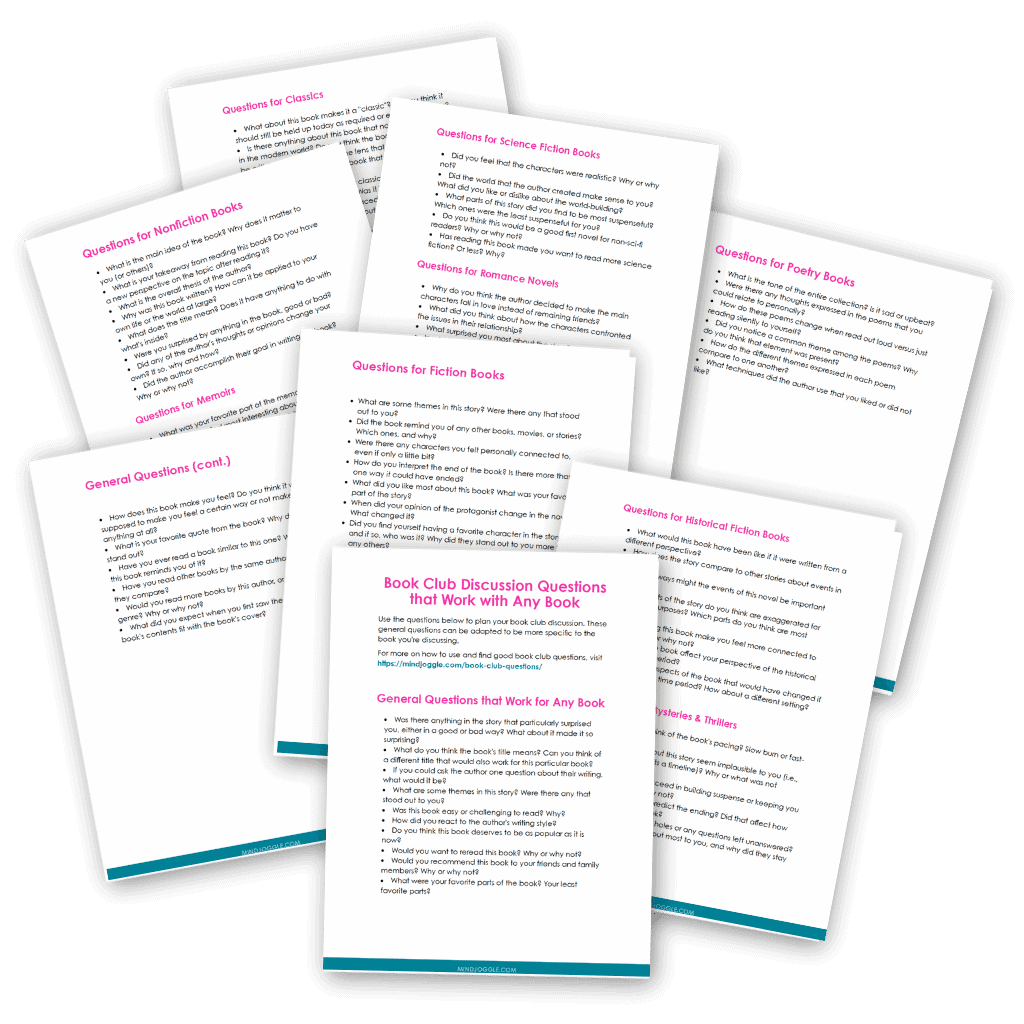How to Run a Book Club Discussion
These tips will help anyone tasked with leading a book club discussion make a plan, create discussion questions, and run a book club meeting.
This post may include affiliate links. That means if you click and make a purchase, I may earn a small commission. Please see Disclosures for more information.
We all love a fabulous book club meeting: lively conversations, time to socialize, and of course, great books. Is there anything better?
The best discussions, however, don’t just happen. They take a little preparation.
Any book club leader doesn’t have to be an expert on the book, but showing up with a variety of discussion topics and potential activities can ensure that the conversation stays interesting and that the group stays engaged and on track.
The tips here can help anyone tasked with leading a book discussion group feel ready to engage with other participants and help steer everyone toward better discussions–without spending a ton of time preparing.
Organizing Book Club Meetings
There are a few logistics to manage for every book club, including where and when the club will meet. Your club should decide if hosts, locations, and leaders will always be the same or if you’ll rotate duties.
For more on the overall logistics, read about how to start a book club.
There’s plenty to consider, but the meeting leader has the responsibility of preparing for a specific meeting and book.
Planning Discussions
If you’re the book club leader–whether for one discussion or all of them–you’ll want to spend a little time planning.
You may want to divide your meeting into sections to cover different aspects of the book, such as characters, plot, themes, and author’s style.
Here are a few ideas to help you structure the meeting:
- Set a clear agenda for discussions
- Allow time for members to share their opinions and debate differing viewpoints
- Allow time for members to share their own experiences and personal reflections
- Consider adding an activity or game related to the book, if it makes sense
- Encourage active participation from everyone.
Pin this!

Leading a Discussion
The Role of a Book Club Discussion Leader
As the leader, your main goal when hosting book clubs is to facilitate discussion and ensure that everyone participates. This means creating an environment where all members feel comfortable sharing their opinions and ideas.
Encourage everyone to contribute, even if they didn’t enjoy the book or have different opinions from the majority of the group.
Try to get comfortable with a little silence; don’t feel like you have to jump in if no one answers immediately (try counting slowly to 10 after asking a question if this is difficult for you!).
Managing Conversations with Book Club Members
As the leader, it’s your responsibility to ensure the discussion stays on track and is balanced. To help maintain the flow of the conversation, try the following tips:
- Set guidelines: Establish rules for the discussion, such as not interrupting others, respecting everyone’s opinions, and staying on-topic.
- Actively listen: Pay close attention to what others are saying and acknowledge their contributions.
- Seek diversity of opinions: Make a conscious effort to include everyone in the conversation and draw out quieter members by asking their opinions on specific topics.
- Keep it brief: To avoid lengthy monologues or heated debates, gently steer the conversation back to the book and remind members to keep their comments concise.
You may want to use a timer to keep rough track of how much time to spend on the topics on your agenda, but also be a little flexible if the group is particularly interested in a thread.
Do your best to ensure that there’s no one person dominating the conversation. Encourage new members to join in with their opinion as well. If you know that certain attendees will speak a lot, you might want to ensure other members are heard early in the meeting.
Generating Discussion Questions
As a book club facilitator, creating interesting and thought-provoking questions is essential for engaging discussions.
To stimulate engaging conversations, focus on developing open-ended questions based on the book’s themes and characters. Avoid simple yes or no inquiries, as they may lead to short answers and minimal participation. Good discussion questions should allow members to express their opinions and invite different perspectives.
You can come prepared with book-specific questions, universal questions that work for any book, and questions that prompt further reflection.
PRintable Book Club Discussion Questions
Get a free printable list of book club questions that work for any book…

PLUS 40+ more genre-specific questions when you subscribe to email updates.
Book-Specific Questions
Questions specifically tailored to the book your club is discussing might address the book’s themes, characters, and plot points. A few tips for crafting book-specific questions:
- Use open-ended questions to promote discussion, avoiding yes-or-no questions
- Focus on different aspects of the book, such as the characters’ motivations, conflicts, or the author’s writing style
- Ask questions that encourage participants to draw on their personal experiences or opinions.
Universal Questions
More general questions can apply to a variety of books, regardless of genre or theme. Universal questions can be particularly useful at the start of the discussion when you’re just breaking the ice and prompting people to weigh in. Some examples of universal questions include:
- What was your initial reaction to the book? Did your opinions change as you read further?
- If you could ask the author one question, what would it be?
- Which character did you relate to the most, and why?
Questions Prompting Further Reflection
Encourage readers to dive deeper by asking questions that prompt reflection. A few examples to consider:
- What would you tell a friend about this book? Would you recommend it, and to whom?
- Did you take away any particular lessons that apply to your own life?
- How did you feel while reading this book?
- Which characters did you relate to, and why?
By combining book-specific questions, universal questions, and questions that prompt further reflection, you’ll be on your way to creating dynamic and engaging discussions that make your book club an enjoyable and enlightening experience for all participants.
Pin this!

Digging Deeper into the Book
As your discussion gets going, your club may want to delve into various aspects of the story, including characters, themes, setting, and plot.
Characters
Understanding the characters in a work of fiction is crucial to appreciating the story. As you lead the discussion, encourage everyone to share their thoughts on the main and supporting characters. You could prompt them with questions like:
- What are the character’s motivations and conflicts?
- How do the characters change throughout the story?
- Which characters were relatable or resonated with you?
Themes
Talking about themes can bring depth to your book club discussions. Try listing a few major themes found in the book and ask your book club members which ones resonated with them the most. Start a conversation by asking questions like:
- How do the themes relate to the characters’ experiences or decisions?
- Are there any recurring motifs or symbols related to these themes?
Remember, interpretations of themes can vary between readers, so be open to different perspectives–we’re not in school, and there’s no right or wrong answers in book club!
Setting
The setting of a story can set the tone and atmosphere. As you discuss the book, consider exploring the following aspects of the setting:
- How does the setting influence the characters and their actions?
- Are there any notable aspects of the time period or location that impact the story?
- How would the story change in a different setting or time period?
Feel free to use visual aids like maps or pictures to help engage your group in the discussion.
Plot
When discussing the plot, focus on both the significant events and smaller details that contribute to the narrative. Some questions to guide your conversation include:
- What were the key turning points in the story?
- How do the subplots contribute to the main storyline?
- Were there any surprising twists or moments that stood out?
Encourage your book club members to discuss their favorite and least favorite parts, and how these moments impacted their overall enjoyment or understanding of the book.
Pin this!

Considering the Author, Writing Style, and Genre
Reviewing the Author’s Background and Motivation for Writing
You may also want to go beyond the book itself and delve into the author’s background and motivations for writing the book.
A great place to start is by reading interviews with the author discussing the book. Authors often provide insightful comments on their inspiration, writing process, and things that changed as they wrote.
This is one of my favorite ways to dive deeper into a book I loved; check out 15 Things You Didn’t Know About A Little Life and 11 Things to Know About The Great Believers for some examples.
Discussing Writing Techniques
Every author has a unique writing style, and your club may want to analyze and discuss the writing techniques used in the book you’re reading.
You might discuss:
- Use of imagery and figurative language
- Narrative voice and tone
- Pacing and structure
- Dialogue and character development
Feel free to bring up specific instances in the book that showcase the author’s writing and research skills, and encourage your fellow book club members to share their insights as well. What did you learn from how the author created a story around their research?
Comparing Genres
Another aspect to consider in your book club discussions is how the book’s genre(s) influence its writing style and themes. Comparing the book to others within the same genre will not only help you understand the author’s choices, but also provide a broader context for discussion.
Remember that genres are most useful for marketing a book; it can be a tough sell if a book doesn’t fit neatly into a genre.
In this section of your discussion, you may want to:
- Identify the book’s genre(s) and discuss common tropes or themes found within the genre
- Consider whether the book crosses genres, and how that affected its marketing and your reading of the book
- Compare and contrast the book with other novels of the same genre
- Discuss the author’s unique take or subversion of the genre’s expectations.
By engaging with the author’s background, writing techniques, and genre choices, you and your book club members will dive deeper into the text and foster engaging, thoughtful discussions.
Get The Latest on Youtube:
Additional Topics to Explore
Comparing Adaptations
If the book you’re discussing has a film adaptation, it can be interesting to compare and contrast the two. Discuss the differences between the book and the movie, and ask your fellow book club members about their thoughts on the changes made.
Consider the effectiveness of the adaptation, whether it captured the essence of the book, and if the chosen actors and actresses fit the characters’ portrayals. Would anyone change the casting choices?
You may want to have a book club movie night and watch the adaptation together.
Public Reactions
Discuss the public’s reactions to the book when it was first published, and how that might have influenced its popularity or reception.
Were people excited about the release? Were there any controversies or scandals? Discuss how those reactions might add context to the book or change your perception or opinion of it.
Awards
Discuss any awards the book has won or was nominated for, like literary prizes or accolades. Do you think the awards are well-deserved, or do you think there are other books that should have won instead?
Talk about the criteria for those awards and if the book meets those standards.
Criticisms of the Book
Finally, delve into any criticisms the book has received, either from professional reviewers or from the general public.
You can look up ratings and reviews to see what others are saying, discuss whether you agree or disagree with the criticisms, and share how they may have affected your overall enjoyment of the book. This can also lead to a conversation about the book’s strengths and weaknesses.
Helpful Resources
These resources may be helpful as you plan to lead your fellow book lovers in discussion. The book recommendations and kits and printable discussion guides can be used to help members discuss a book, while the games, activities, and ideas for reading goals and challenges can add some variety to your future meetings.
Book Club Recommendations
Selecting a great book for your club can be challenging, but there are plenty of recommendations based on different genres, themes, and preferences. You may want to explore different categories, such as:
Keep in mind the preferences of your group members when making your selection, as well as the desired level of difficulty and depth of discussion.
Here’s how to pick a winning book for book club, including ideas for how to make the selection process fun and engaging for everyone.
Book List Library
Get 30+ free printable reading lists
when You Subscribe to Updates
Book Club Kits
Book club kits can be an excellent tool for enriching your meetings; check with your local library to see if they offer any kits.
Kits typically include multiple copies of a book, a discussion guide with questions, and sometimes additional materials like author interviews or background information on the book’s setting.
You could also create one yourself with materials to supplement the book.
In addition to a printable discussion guide, you might consider article printouts that provide background on the book or author, printouts of relevant images or maps, game or activity instructions, or recipes if there is a food tie-in.
Book Club Games and Activities
To make your book club meetings more engaging and entertaining, consider incorporating some games and activities. These can include:
- Trivia quizzes related to the book’s content
- Themed snacks or drinks inspired by the story
- Charades with characters and plot points from the book
Remember to choose activities that are appropriate for your group’s size, preferences, and the book’s content to create a fun and memorable meeting.
Reading Goals and Challenges
Setting reading goals and challenges can be a great way to motivate your book club members and create a sense of achievement. Some ideas for reading goals include:
- Reading a specific number of books per year
- Reading books from various countries, cultures, or time periods
- Exploring a new genre
- Reading books by diverse authors
Establish your reading goals as a group to keep everyone engaged and accountable in achieving them throughout the year. Here are more ideas for reading challenges.
You don’t need to use all of these ideas when leading a book club meeting, but coming ready with a variety of questions, discussion topics, and strategies for managing the conversation will help you feel prepared for anything that comes up.
If you have great ideas for leading a book club discussion, please share them in the comments. Happy book clubbing!









